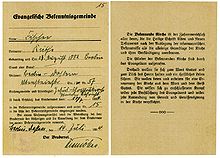Brother council

A fraternal council was a largely informal body for the collegial leadership of Protestant parishes or parts of them in the Confessing Church during the church struggle in the time of National Socialism from 1933 to the outbreak of the Second World War.
development
During the time of National Socialism, the German Christians (DC) strived for a national, völkisch church close to the National Socialist German Workers' Party and centrally led from above according to the Führer principle , thereby distancing themselves from the traditional beliefs and community structures. With their national sentiments, the German Christians were able to achieve majorities in the presbyteries and church leaderships, but with their support for the Aryan paragraph and the complete denial of Jewish influence, they also met with increasing resistance. After the Dahlem Confessing Synod in October 1934, at which the “emergency law” was passed, the pastors and their parishes, often only parts of them, who professed to be “true”, joined forces (on a green card ) with their own leadership and administrative structures to form Confessing Churches. These were headed by an informally constituted brother council, which was confirmed by the leading Reich brother council . In many cases, the officially elected structures, some of which were occupied by the German Christians, continued to exist in parallel. Church taxes continued to be paid, while the “illegal activities” and also the illegal pastors (if the legal pastor was DCler) were financed through donations and voluntary contributions.
Church organization through brother councils
The structures of the Evangelical Church from below continued in higher committees of the regional churches, if they were dominated by the DCers, up to the Reich Brotherhood Council .
See also
literature
- Renate Penßel: Church leadership concepts in the church struggle: The drafts of the Confessing Church and the German Christians in comparison (PDF; 140 kB) Church Law Institute of the EKD online, 2008
- Karl-Heinz Fix, Carsten Nicolaisen, Ruth Papst: Handbook of the German Protestant Churches 1918 to 1949. Organs - offices - people. Volume 2: State and Provincial Churches Work on contemporary church history. - Volume 020, Vandenhoeck & Ruprecht, Göttingen - 1st edition 2017, ISBN 978-3-525-55794-5
Web links
- Evangelical Resistance: Brother Council of the Thuringian Confessing Church
- Evangelical Working Group for Contemporary Church History Research Center Munich
- German Historical Museum Foundation - The Confessing Church
Individual evidence
- ↑ Example from Gelsenkirchen: Establishment of the community council on November 12, 1934 at gelsenzentrum.de (accessed January 31, 2013)
- ↑ Niemöllerhaus exhibition, especially panel 14 and accompanying text (accessed Jan. 2013)
- ^ Church organization Confessing Church (comparison with German Christians via menu and table 14) . Exhibition in the Niemöllerhaus (accessed January 31, 2013)